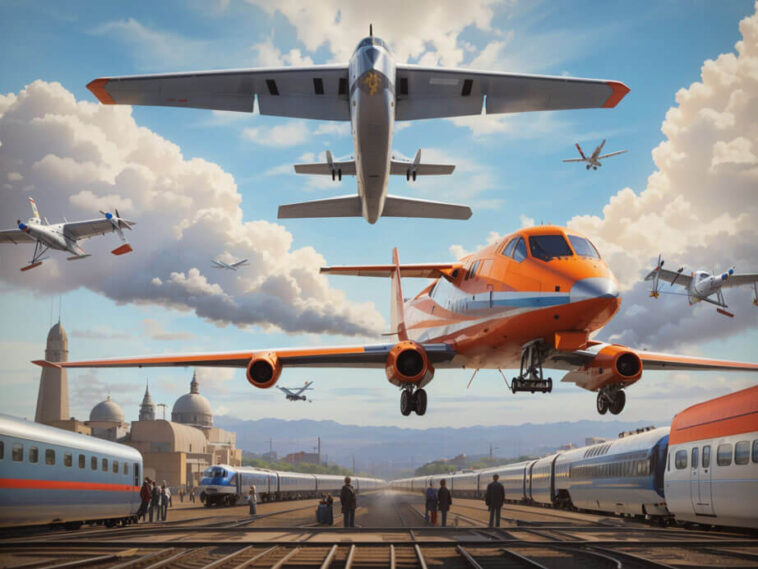The trains fares in Europe is 30 times higher than plane fares, says Greenpeace
A new report published by Greenpeace EU exposes a massive price discrepancy between train and plane fares for the same European routes. According to the analysis, train tickets can cost up to 30 times more than flights on some popular journey pairs.
This startling finding highlights the monumental challenges that must be confronted to shift travel demand away from high-emission planes towards more climate-friendly rail transport across Europe. Aviation currently accounts for 3% of global emissions and 13.9% of all transport greenhouse gases in Europe. With air travel projected to grow rapidly, making affordable and accessible train journeys is considered crucial for reducing the sector’s environmental impact and achieving net zero emissions.
Key Data Points from Greenpeace’s “Tourists Go Home” Report on train fares
- Average train fares are 6 times higher than equivalent flights around Europe
- London to Barcelona: Train fare is 30 times more expensive than flying
- Amsterdam to Barcelona: Train ticket costs 22 times higher than flight
- Vienna to Brussels: 16 times pricier by train compared to plane
- Warsaw to Paris: Train fare is 15 times higher than low-cost flight
- Brussels to Budapest: 10 times costlier by rail than air travel
Greenpeace highlights that taxation differences provide airlines with an unfair €39 billion per year subsidy advantage over railways in Europe. Exemptions from fuel taxes and VAT mean aviation’s climate costs are not adequately reflected in ticket prices.
Massive Environmental Benefits of Shifting Short Haul Flights to train and fares
Experts widely agree shifting passenger journeys from carbon-intensive planes to energy-efficient electric trains is essential for reducing emissions from transport and achieving Paris Agreement goals of limiting global temperature rise to 1.5°C or 2°C above pre-industrial levels.
Key statistics showing trains are far more environmentally sustainable than planes:
- Train journeys produce 14 times less carbon dioxide emissions per passenger kilometer on average compared to aviation.
- Rail accounts for just 0.4% of all greenhouse gas emissions from transport in the EU vs 13.9% for domestic and international flights.
- Air travel demand is projected to double or even triple by 2050, which could seriously undermine climate targets.
- The EU has set a goal for the majority of passenger journeys under 500 km to shift from aviation to rail by 2050.
Barriers Preventing Cheaper, Accessible and Competitive Rail Travel
While greener than flying, trains are currently far less affordable and accessible for most travellers in Europe. Key factors driving up rail costs and limiting capacity:
- Limited rail infrastructure – Constructing new tracks and connections is costly and complex, resulting in limited routes.
- Fragmented cross-border networks – Differing technical systems, regulations and standards across countries cause major inefficiencies.
- Aviation’s tax privileges – No fuel taxes and VAT exemption provides airlines with an unbalanced cost advantage over railways who pay full energy taxes and VAT.
- Dominance of budget airlines like Ryanair and EasyJet who have drastically reduced air fares through tax breaks and subsidies.
This creates an uneven playing field between aviation and rail transport.
Policy Reforms Proposed to Support Affordable, Accessible and Competitive Rail
To help make train fares more affordable and drive modal shift away from high-carbon aviation, Greenpeace and other advocacy groups strongly recommend reforms including:
- Removing kerosene tax exemptions for airlines to ensure fair competition with railways
- Ending reduced VAT rates on plane tickets to increase flight costs to reflect environmental impacts
- Expanding and upgrading rail connections, capacity and speed between major European cities
- Enabling affordable cross-border rail ticketing through common technical standards and regulations
- Investing heavily in new high-speed rail infrastructure to increase capacity and reduce journey times
- Harmonizing operating rules and regulations for rail networks across Europe to improve efficiency
- Accelerating the transition to renewable energy to power sustainable, low-emission rail systems
Conclusion
The massive price discrepancy between rail and air fares exposed by Greenpeace highlights the substantial challenges that must be addressed to realize more sustainable mobility patterns in Europe. Making affordable, accessible and eco-friendly train travel possible for all will require rethinking aviation taxes and subsidies while massively expanding and improving cross-border rail infrastructure and services. With sufficient political determination and smart reforms, experts believe trains can replace planes as the default option for shortest and medium-haul passenger journeys across Europe within the coming decades.
FAQ’s
What does the Greenpeace report reveal about train vs plane fares in Europe?
The report found train tickets can cost up to 30 times more than plane fares for the same European routes. On average, trains were 6 times more expensive than flights.
Why is there such a big price gap between rail and aviation?
Limited rail capacity, fragmented cross-border rail networks, huge tax privileges for airlines like no fuel tax and VAT exemptions, and the rise of cheap budget airlines are key reasons for the big price gap between rail and aviation.
Why is it important to reduce the price gap between planes and trains?
Aviation emits far more greenhouse gases than rail travel, so making trains cheaper and more accessible will help reduce transport emissions and combat climate change by shifting travel demand to more sustainable options.
What policy changes does Greenpeace recommend?
They call for ending airline tax breaks, investing heavily in new trans-European rail infrastructure, harmonizing rail regulations across borders, and accelerating the transition to clean energy to power environmentally friendly train networks.
How much less carbon does train travel emit than flying?
On average, trains emit 14 times less carbon dioxide per passenger kilometer than plane journeys around Europe. Shifting to rail is key for sustainable mobility.
To find out more about the hottest topics in Travel and Tourism, click here.





